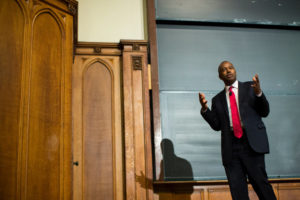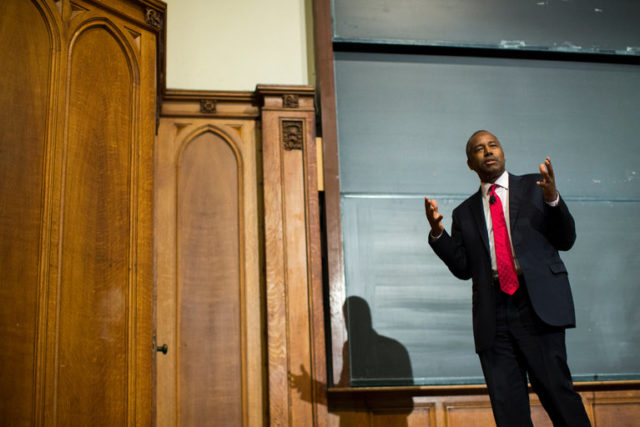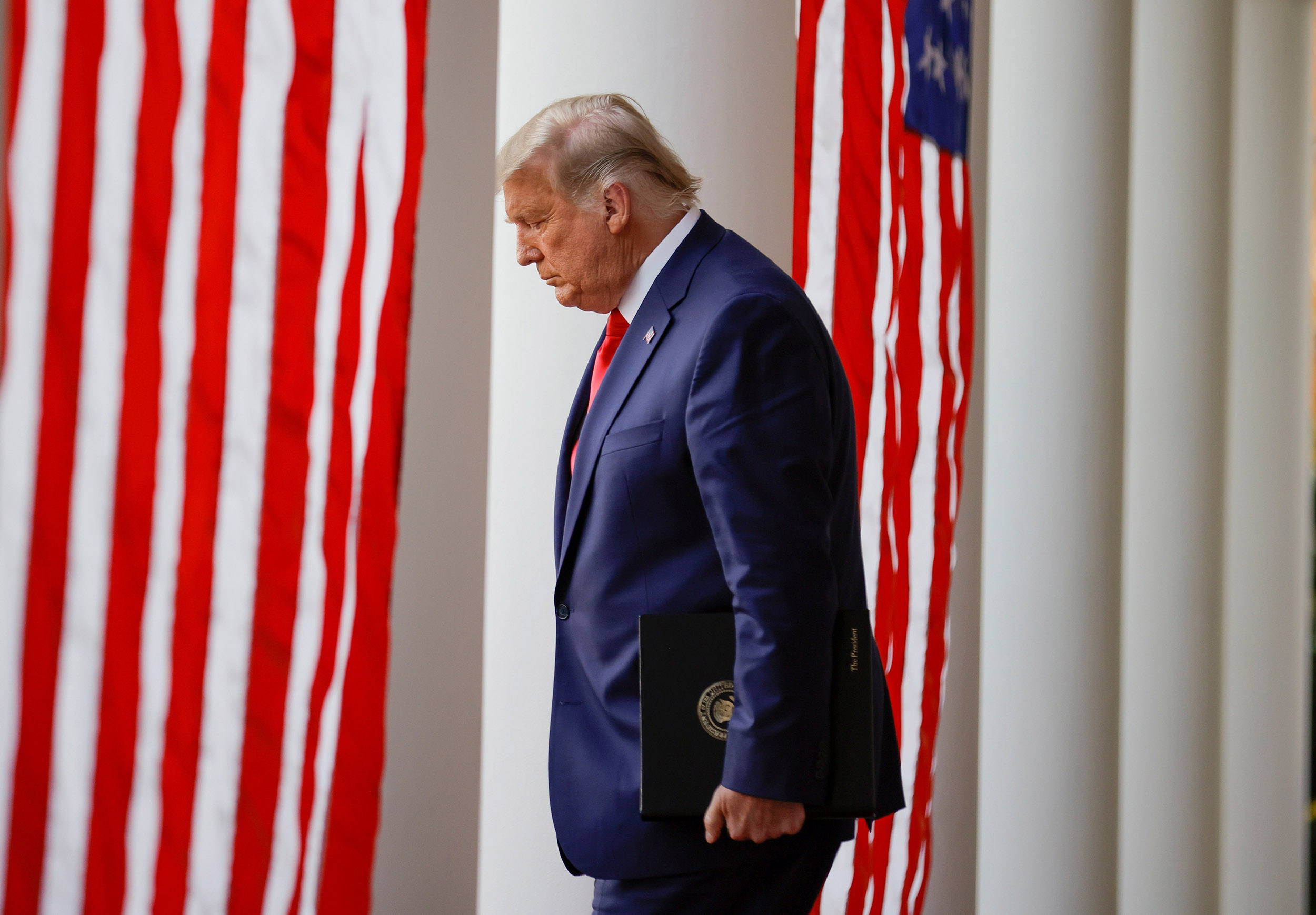 Between the several jobs she worked and the scramble to feed her sons, often with food stamps, Sonya Carson used to recite a poem to keep her son Ben and his brother focused on lifting themselves out of their impoverished neighborhood in Detroit.
Between the several jobs she worked and the scramble to feed her sons, often with food stamps, Sonya Carson used to recite a poem to keep her son Ben and his brother focused on lifting themselves out of their impoverished neighborhood in Detroit.
“If things go bad for you and make you a bit ashamed, often you will find out that you have yourself to blame,” Mayme White Miller’s poem begins. “You’re the captain of your ship, so agree with the same, if you travel downward you have yourself to blame.”
Those words, drummed into Ben Carson’s memory, appear to have framed the retired neurosurgeon’s views on urban renewal, mandated racial integration and the proper role of government in addressing the nation’s social woes. Now Mr. Carson, tapped by President-elect Donald J. Trumpto become the next secretary of housing and urban development, will most likely have the power and opportunity to apply his mother’s conservative message to people’s lives as he heads an agency with a $47 billion budget and a charge to assist millions of low-income renters, fight urban blight and help struggling homeowners stave off foreclosures.
Mr. Carson has no experience running a large federal bureaucracy, and aside from a failed run for the presidency, has no background in government. But if confirmed by the Senate, he would enter public service with a background like few other cabinet officials in history, shaped profoundly by a childhood when public assistance meant survival and public housing was all around him.
Rather than embrace the programs that once sustained his family and the families around him, he has resolutely rejected them, adopting standard Republican beliefs that welfare fosters dependency.
“The government should build and maintain infrastructure that supports population growth, business and self-improvement endeavors,” he wrote in his book, “A More Perfect Union.” “It should not, however, meddle in the affairs of all the citizens or control every aspect of their lives, as is done in many communist and socialist countries.”
Mr. Carson’s conservative views on government policy — coupled with the credibility his own remarkable story brings — worry experts who believe government should be doing more, not less, for the nation’s cities, where glittering downtowns and increasingly affluent neighborhoods are often surrounded by areas of poverty and violence, with predominantly minority residents.
“The concern about government interference in the administration of housing programs in our cities, to me, seems unfounded,” said Stefanie A. DeLuca, a professor of sociology at Johns Hopkins University who specializes in housing policy. “This danger of social engineering our cities and suburbs is overblown in comparison with the gains that we could be making in fair housing.”
But Mr. Carson’s views, born of his own bootstraps background, would be difficult to shake.
“Everybody had working parents, and it prepared you for the fact you were going to have to work for a living,” said Steve Choice, 61, who grew up next door to Mr. Carson. “That was the American way. That was how you made your living, how you purchased things, and how the world moved. You had to work.”
Dorian Reeves, 65, a former classmate of Mr. Carson’s from Detroit, remembered his mother regularly summoning her son from playing basketball to study. “He didn’t go to the parties,” Mr. Reeves said. “He didn’t hang out at the football games. He would have to go home and he would have to study. He would always be reading. That’s what his mother wanted.”
Mr. Carson was awarded a scholarship to Yale University, and at 33, was named director of pediatric neurosurgery at Johns Hopkins Hospital. He became an author and a philanthropist supporting scholarships for young, often impoverished students.
“He just doesn’t want to walk in and say all the federal programs that take care of housing should be cut,” Mr. Williams said. “He wants to make it work for the people.”
Even while working as a surgeon with a heavy patient load, Mr. Carson spent much of his time traveling around the country trying to help inner-city children through the Carson Scholars Fund, a foundation he started, said Henry Brem, the chief of neurosurgery at Johns Hopkins Hospital who worked with Mr. Carson for 30 years.
But for Mr. Carson, a devotion to bettering urban youth does not equate to promoting racial integration, at least not through government. In his memoir “Gifted Hands,” the word integration appears only once, when he said patients could not believe he had earned his position as the chief of pediatric neurosurgery.
“At first they eyed me suspiciously, wondering if somebody had given me my position as a token expression of integration,” he wrote.
Such moments helped turn Mr. Carson against racial integration through policy. In an opinion article last year for The Washington Times, Mr. Carson compared an Obama administration housing regulation to “the failure of school busing.” The rule, known as Affirmatively Furthering Fair Housing, was years in the making and was intended to end decades-old segregation by offering affluent areas incentives to build affordable housing.
“These government-engineered attempts to legislate racial equality create consequences that often make matters worse,” he wrote. “There are reasonable ways to use housing policy to enhance the opportunities available to lower-income citizens, but based on the history of failed socialist experiments in this country, entrusting the government to get it right can prove downright dangerous.”
The Rev. Derek McCoy, vice president of CURE, a nonprofit focused on culture, race and poverty on whose board Mr. Carson has served, said that thinking would remain at the core of Mr. Carson’s approach.
“If it doesn’t have an exit date to it, then he probably won’t put an entry on it,” he said. “The things that have entry points and no exit points, I think he is going to have a real challenge with those.”
In interviews and writings, Mr. Carson has embraced standard conservative views that too much government help — both in desegregating neighborhoods and in lifting people from poverty — can discourage people from working hard. Coming from someone with his background, however, those views have far more power than when they are stated by someone like House Speaker Paul D. Ryan, who also speaks of the social safety net becoming a hammock.
Ideology aside, the most pushback Mr. Carson has faced has come from his lack of expertise in housing policy. That is a concern even some of his oldest friends share.
“To me, it seems like they put him in the wrong job,” said Mr. Reeves, the former classmate of Mr. Carson’s from Detroit. “He’s very smart man, but he’s a brain surgeon. Why didn’t they let him deal with medicine and be like surgeon general? That’s the job I thought he would get. But that’s politics.”








Comment:Mr Ben Carson is a very good man and a good mentor, the position of Secretary of housing and urban development is not a very good decision, he should be given responsibility in line with his area of specialisation since he is a good surgeon. But notwithstanding from his childhood background and training, he can do something great.